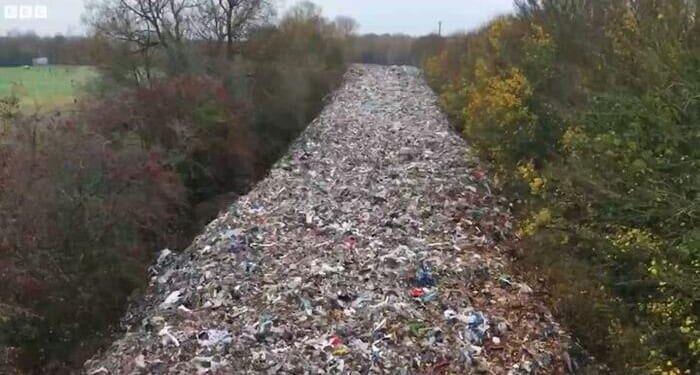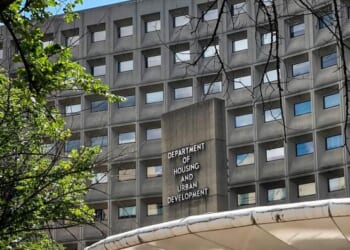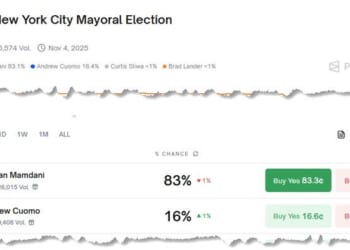Submitted by Thomas Kolbe
In Oxfordshire, England, along the River Cherwell, a massive illegal landfill has been discovered. Over a stretch of 150 meters, tons of waste have accumulated, posing a serious environmental threat. This is not an isolated incident in England, which now faces the mafia-like structures of its waste and water industry.
Oxfordshire, located northwest of London, is usually a tranquil natural paradise. The county is home not only to the world-famous University of Oxford – it has now also become the scene of a striking environmental scandal.
Over a length of 150 meters in the river’s floodplain, hundreds of tons of plastic waste have piled up. A massive ecological disaster is looming: toxic substances could seep into the groundwater if the river overflows during heavy rains.
Calum Miller, the Liberal Democrat MP for the constituency, demanded immediate government cleanup efforts to prevent an environmental and groundwater catastrophe.
Not an Isolated Case
This waste scandal is far from unique. Britain is experiencing a true flood of garbage – a systemic problem evident in many locations, including the banks of the Thames in west London, near Hammersmith Bridge. Years ago, a massive waste island was discovered there, now known as “Wet Wipe Island.”
The mass consists primarily of wet wipes flushed down the drain. In some places, the accumulation reaches up to a meter high.
The weight of the island is enormous: 180 tons, stretching along roughly 250 meters of riverbank – an area comparable to two tennis courts.
The cause is not only the widespread use of wet wipes. London’s outdated sewage system also plays a critical role. During heavy rain, overflows send wipes directly into the Thames, causing severe damage to the waterway and wildlife.
According to the UK Environment Agency, over 3.6 million hours of raw sewage were discharged into rivers and coastal waters in 2023 alone – conditions comparable to developing countries. Despite well-intentioned declarations, nothing has changed about England’s poor water quality, warned Giles Bristow of “Surfers Against Sewage.”
Meanwhile, additional infrastructure fees charged to households have risen by £123 per year, Bristow noted.
Pseudo-Privatization and Capital Extraction
The roots of the problem go back decades. During the economic crisis 36 years ago, England broadly privatized the waste and water sector without defining a true market structure with open competition and minimum standards.
This opened the door to corruption – a British-style “Kölscher Klüngel (Cologne-style regional corruction).”
Since then, Britain’s waste, sewage, and recycling industry has developed a mafia-like system that acts as a capital extraction machine, attracting mostly foreign investors.
The Usual Suspects
About 70% of investor capital in the UK water sector comes from foreign sources, reports The Guardian.
Familiar names are involved: asset managers BlackRock and Vanguard (the Siamese twins) in Severn Trent, Abu Dhabi Investment Authority in Thames Water, and Hong Kong’s CK Hutchison Holdings as 75% majority owner of Northumbrian Water.
Connections in politics pay off, becoming part of the well-oiled revolving door between government and the private sector. High-ranking politicians reportedly move back and forth like “springboard jackdaws” – a prime example of a revolving door between politics and extraction business.
Simple Structure
The profit-extraction structure follows a simple pattern, like a choking web over parts of society: the waste and water industry was regionally divided, privatized, and licensed to monopoly operators largely free from regulation.
The lack of competition and legal obligations for minimum standards or infrastructure investment allows astronomical returns, which investors extract and largely transfer abroad.
The environmental damage and enormous social costs, however, are borne by British taxpayers. Public health consequences alone merit separate analysis.
We face criminal operations protected by law and executed by operators of this extraction model.
Market Opening and Liability Rules
The solution is obvious: open the market – even to smaller local providers. Competition would force established operators to improve quality. A classic liberal economist demand – full internalization of liability and damages for affected parties – should have been implemented long ago.
The political resistance to such reforms shows the tight entanglement of regional politics and monopoly operators.
It is a perilous alliance that has seized one of the most sensitive areas of public hygiene and environmental policy in Britain – now under maximum public pressure.
A feasible interim solution to curb the extraction strategy could be a capital buffer deposited upon market entry, dedicated to potential environmental damage.
It is not the classical market solution – but it may be the only way to quickly relieve fiscal pressure on an already heavily indebted British government now liable for the damage.
* * *
Authored by Thomas Kolbe, born in 1978 in Neuss/ Germany, is a graduate economist. For over 25 years, he has worked as a journalist and media producer for clients from various industries and business associations. As a publicist, he focuses on economic processes and observes geopolitical events from the perspective of the capital markets. His publications follow a philosophy that focuses on the individual and their right to self-determination.
Loading recommendations…

















